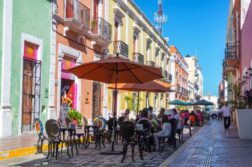It depends on the precautions you take and how comfortable you feel, but going on vacation during a pandemic isn’t risk-free.
Summer is just around the corner, and in a normal (read: non-pandemic) situation, you’d probably be gearing up to go on vacation right about now (or at least finalizing your getaway plans). COVID-19, however, has forced people to rethink or even cancel their travel plans, wondering about the safety of vacationing right now—especially when it comes to renting an Airbnb or vacation home.
The pandemic isn’t stopping everyone, though: A publicist for the booking site Vrbo recently told Health via email that «beginning in mid-April Vrbo started seeing encouraging improvement in US travel demand for vacation rentals, especially for longer trips during the end of summer.» (Airbnb did not respond to Health’s request for comment.)
Guidance on what to do to lower your risk of contracting COVID-19 is always subject to change but, as of now, the Centers for Disease Control and Prevention recommends that you stay home as much as possible. “Travel increases your chances of getting and spreading COVID-19,” the CDC says. If you do need to travel, the CDC recommends checking with state and local health departments on travel restrictions and stay-at-home or shelter-in-place orders at the place you plan to visit.
Still, it’s understandable that you might have some questions: Doesn’t renting a house for an extended stay someplace else still qualify as “staying home”? And can’t you still technically practice social distancing while you’re there? What about the place you rent itself—is it safe to go there?
Is it safe to rent an Airbnb or visit a vacation rental?
Unfortunately, the answer to this isn’t so clear-cut—some experts believe it’s OK, while others think you should absolutely stay home.
First, a quick recap on some COVID-19 basics: The CDC says that the virus mainly spreads through person-to-person contact, like an infected person coughing, sneezing, or talking within six feet of you. You can also get the virus from touching a surface that has the virus on it and then touching your mouth, nose, or your eyes, but the CDC says that this is not thought to be the main way the virus spreads. (However, they do include the caveat that experts are still learning more about the virus.)
Research has studied how long SARS-CoV-2, the virus that causes COVID-19, can live on surfaces. Here’s a quick breakdown of the study, which was published in The New England Journal of Medicine:
- Copper: 4 hours
- Cardboard: 24 hours
- Plastic: 2-3 days
- Stainless steel: 2-3 days
As far as a the safety of a vacation rental goes, there are a lot of variables that come into play and it’s “unclear” how safe vacation rentals are right now, says Jill Weatherhead, MD, an assistant professor of tropical medicine and infectious diseases at Baylor College of Medicine. She lists off local transmission of COVID-19 and how many people are visiting that area as things to consider. “In vacation areas that have high community transmission of SARS-CoV-2 or in areas that will get a lot of visitor foot traffic from different areas, the risk of viral transmission could be significant and could lead to new viral hot spots in vacation towns,” she says. But, if you’re planning to visit a more isolated area where you can do a better job of social distancing, there’s less of a risk.
How long it’s been since someone was in the vacation home matters, too. “If no one has been in the vacation rental for several days, the property is unlikely to contain infectious virus particles based on what we know about how the virus survives,” says Donald Schaffner, PhD, a microbial risk assessment and cross contamination expert at Rutgers University.
“Surface transmission is less of an issue than respiratory transmission but there is always going to be a risk that there may be some residual virus on a surface,” says infectious disease expert Amesh A. Adalja, MD, senior scholar at the Johns Hopkins Center for Health Security.
Still, a lot of it comes down to your comfort level. “Everybody needs to choose the level of caution they’re comfortable with,” says Henry Raymond, DrPh, an associate professor of epidemiology and biostatistics at Rutgers University. “Everyone is different.”
What rental booking sites doing to keep you safe?
Booking sites like Vrbo and Airbnb have released guidelines for owners and property managers on how to properly clean their rentals, including making sure that cleaners use personal protective equipment (PPE) and prioritize cleaning high-touch surfaces. Airbnb hosts can also use a “booking buffer” to block out a space of time after a rental is used to allow time for airborne particles to settle.
That said, if it makes you feel more comfortable, you can also clean your rental even more once you get there, says Dr. Adalja. That means wiping down commonly-touched surfaces like door knobs, toilet handles, and faucets with disinfectant just to be safe—though he says it’s not required if you know the place had been cleaned before you got there.
But even with those extra precautions, some doctors point out that it’s still safer to stay put. “People need to stay home. Traveling should not be considered. Staying in a rental is not safe,” says Richard Watkins, MD, an infectious disease physician in Akron, Ohio, and an associate professor of internal medicine at Northeast Ohio Medical University. “I recommend against it. People need to take COVID-19 very seriously.”
Should you and your family self-isolate before you go?
Not necessarily. Technically, you should be staying home as much as possible right now anyway, Dr. Schaffner points out. So, if you’ve been doing that, he says you should be fine.
There’s also this to consider, per Dr. Weatherhead: It’s unclear whether quarantining before you travel does anything. “If people are traveling from areas with high viral community transmission or traveling to areas with high viral community transmission, they should review their local and state guidelines prior to traveling to evaluate any travel restrictions,” she says. “If traveling from areas with low viral transmission to other areas with low viral transmission, it is likely unnecessary to quarantine prior to leaving.”
But, she points out, you should still practice social distancing once you get there. “Avoiding large gatherings including beaches, pools, restaurants, and parties is critical to preventing future hot spots in vacation destination sites,” she says.
Is it OK to share a house with other friends or families?
This also goes back to the level of risk you’re willing to take. Is sharing a house with other people as safe as you can be? Nope. Could you do it and end up just fine? Yep, but it’s not a guarantee. “It’s all going to be a personal risk preference,” says Dr. Adalja. Ideally, you’d limit the number of people in the home to 10 and allow just close family members—like those in your immediate household—says Dr. Watkins.
Dr. Schaffner reiterates that the main way the virus spreads is from person to person, and that it can be spread by people who have no symptoms. “Rules about meeting up with other families should follow recommended practices for the location where the rental home is located,” he says. “Just because you are on vacation doesn’t mean the virus is taking a vacation.”
If you want to do a joint vacation with family and friends, Dr. Raymond recommends having other people you’re planning to meet up with stay in another home nearby. Then, he says, you can do social distancing meet-ups, like enjoying cocktails in the driveway while spread out from each other. “Social distancing is still a good thing to do,” he says.
What can you do once you’re actually on vacation?
Local rules and regulations still apply, whether you’re on vacation or not, so it’s important to read up on those in advance, Dr. Raymond says. Also, it’s still important to follow best practices for preventing the spread of COVID-19 when you’re on vacation, like practicing social distancing, washing your hands regularly, wearing face masks in public, and doing your best to avoid large gatherings of people.
Some coastal communities are opening up their beaches, but some are asking people to wear a mask while they’re there and to maintain social distancing on the shore and in the water. It’s a good idea to read up on local rulings in advance, Dr. Raymond says.
Is there anything else to consider before booking a vacation home?
Absolutely. Keep in mind that, if you’re traveling far to get to your destination, you may need to make pit-stops to use the bathroom and get gas—and those are situations that can open you up to the risk of being exposed to COVID-19, Dr. Adalja says.
Also, while you’re probably focused on what you can do to keep yourself and your family healthy, it’s important to remember that you could be putting the health of others in danger by packing up your family and heading to another part of the country. Not only do you risk exposing other people, if you get sick with COVID-19 on vacation, you could be one of many others taxing the local health system. “That’s an important consideration.” Dr. Adalja says. “Some community hospitals don’t have many ICU beds and can’t handle a sudden influx of patients.”
And finally, Dr. Watkins recommends keeping this in mind: If you get sick on vacation, there’s a risk that you could be hospitalized away from home, with no chance of having visitors.
Ultimately, most experts say going on vacation right now isn’t a risk-free move—that means you have to decide if going on vacation is a risk you (and your family) are willing to take.
The information in this story is accurate as of press time. However, as the situation surrounding COVID-19 continues to evolve, it’s possible that some data have changed since publication. While Health is trying to keep our stories as up-to-date as possible, we also encourage readers to stay informed on news and recommendations for their own communities by using the CDC, WHO, and their local public health department as resources.



